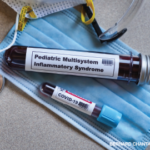What accounts for this difference in effects of anticoagulation in critically ill versus non-critically ill patients? In severe COVID-19, it appears that thrombus formation is driven by a cascade of cytokines and other proinflammatory products that produce surface-bound complexes and fibrin-bound thrombin. These complexes are very resistant to inhibition by antithrombin, the key cofactor in heparin and LMWH. Because formation of such complexes may be reduced in patients with moderate disease, this could explain the potential benefit of thromboprophylaxis in non-critically ill patients compared to the lack of benefit in critically ill patients with COVID-19.6
Vasculitic Features of COVID-19
Dr. McGonagle also discussed his group’s work on the vasculitic features of COVID-19 disease. Some patients with asymptomatic or mild COVID-19 have demonstrated a mild cutaneous vasculitis that is associated with a robust immune response, typically seen in otherwise healthy young patients. This cutaneous vasculitis, which has a predilection for the toes and represents the entity that has colloquially been called “COVID toe,” shows significant type I interferon (IFN) production and occurs in the context of an intact anti-SARS-CoV-2 immunity.
In other patients with non-severe infection, either classical Kawasaki disease or Kawasaki-like disease in the form of multisystem inflammatory syndrome of children (MIS-C) and of adults (MIS-A) can occur, with MIS-C and MIS-A showing prominent cardiac muscle involvement and the absence of coronary aneurysms. Certain patients may manifest myocarditis as part of the Kawasaki phenotype but others may have myocarditis independent of other features of Kawasaki disease.
Finally, several vasculitis mimics seen with COVID-19 are mediated by pulmonary intravascular coagulopathy, hypoxemia, pulmonary hypertension and systemic venous thromboembolism. Importantly, Dr. McGonagle explained that postmortem findings in patients with COVID-19 have revealed a novel site of thrombosis in the pulmonary venous territory (distal to the alveolar capillary bed) and that this can serve as a nidus for systemic microembolism.7
IFN Pathway
After Dr. McGonagle’s talk, several abstracts were presented to further explore the pathophysiology and implications of COVID-19 disease. Timothy Niewold, MD, Judith and Stewart Colton Professor of Medicine and Pathology and director of the Colton Center for Autoimmunity at New York University, discussed the IFN pathway and its links to both lupus and to attenuation of acute COVID-19. Dr. Niewold explained that certain gain-of-function IFN pathway alleles seem to increase the risk of systemic lupus erythematosus (SLE) but may also provide protection against certain viral infections (indeed, such protective effects could explain why these alleles persist in the general population).



